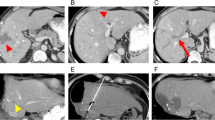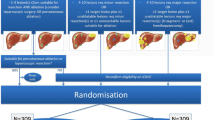Abstract
Introduction
Hepatic resection is the mainstay of treatment for solitary colorectal liver metastases (mCRC); however, some patients are not ideal candidates. The aim of this study was to compare outcomes for patients with solitary mCRC who underwent resection or ablation.
Methods
A retrospective review of a hepatobiliary database identified patients with solitary mCRC. Patients who were treated with hepatectomy were compared to patients who underwent thermal ablation.
Results
The median follow-up time was 25.9 months. Ninety-four patients (67.1%) underwent resection whereas 46 patients (32.8%) underwent ablation. Of the resected patients, most (60%) required a major hepatectomy. Tumor ablation was a significant predictor of overall survival (p = 0.002, OR 3.75, 95% CI 1.696–8.284). Overall, the median disease-free survival was 55.2 months for patients undergoing resection vs. 42.6 months for ablated patients (p = 0.073). Median overall survival was 112.7 months for patients undergoing resection vs. 50.2 months for patients undergoing ablation (p = 0.005).
Conclusion
Patients with solitary hepatic colorectal cancer metastases should be considered for hepatic resection as this provides superior survival when compared to thermal ablation.



Similar content being viewed by others
References
Siperstein, A. E., Berber, E., Ballem, N., and Parikh, R. T. Survival after radiofrequency ablation of colorectal liver metastases: 10-year experience. Ann. Surg. 246:559–565, 2007.
Biasco, G., Derenzini, E., Grazi, G., Ercolani, G., Ravaioli, M., Pantaleo, M. A., and Brandi, G. Treatment of hepatic metastases from colorectal cancer: many doubts, some certainties. Cancer Treat. Rev. 32:214–228, 2006.
Abdalla, E. K., Vauthey, J. N., Ellis, L. M., Ellis, V., Pollock, R., Broglio, K. R., Hess, K., and Curley, S. A. Recurrence and outcomes following hepatic resection, radiofrequency ablation, and combined resection/ablation for colorectal liver metastases. Ann. Surg. 239:818–825, 2004.
Oshowo, A., Gillams, A., Harrison, E., Lees, W. R., and Taylor, I. Comparison of resection and radiofrequency ablation for treatment of solitary colorectal liver metastases. Br. J. Surg. 90:1240–1243, 2003.
Aloia, T. A., Vauthey, J. N., Loyer, E. M., Ribero, D., Pawlik, T. M., Wei, S. H., Curley, S. A., Zorzi, D., and Abdalla, E. K. Solitary colorectal liver metastasis: resection determines outcome. Arch. Surg. 141:460–466, 2006.
Fong, Y., Fortner, J., Sun, R. L., Brennan, M. F., and Blumgart, L. H. Clinical score for predicting recurrence after hepatic resection for metastatic colorectal cancer: analysis of 1001 consecutive cases. Ann. Surg. 230:309–318, 1999.
Cummings, L. C., Payes, J. D., and Cooper, G. S. Survival after hepatic resection in metastatic colorectal cancer: a population-based study. Cancer 109:718–726, 2007.
Minagawa, M., Makuuchi, M., Torzilli, G., Takayama, T., Kawasaki, S., Kosuge, T., Yamamoto, J., and Imamura, H. Extension of the frontiers of surgical indications in the treatment of liver metastases from colorectal cancer: long-term results. Ann. Surg. 231:487–499, 2000.
Kokudo, N., Miki, Y., Sugai, S., Yanagisawa, A., Kato, Y., Sakamoto, Y., Yamamoto, J., Yamaguchi, T., Muto, T., and Makuuchi, M. Genetic and histological assessment of surgical margins in resected liver metastases from colorectal carcinoma: minimum surgical margins for successful resection. Arch. Surg. 137:833–840, 2002.
Ohlsson, B., Stenram, U., and Tranberg, K. G. Resection of colorectal liver metastases: 25-year experience. World J. Surg. 22:268–276, 1998.
McKay, A., Dixon, E., and Taylor, M. Current role of radiofrequency ablation for the treatment of colorectal liver metastases. Br. J. Surg. 93:1192–1201, 2006.
Wood, T. F., Rose, D. M., Chung, M., Allegra, D. P., Foshag, L. J., and Bilchik, A. J. Radiofrequency ablation of 231 unresectable hepatic tumors: indications, limitations, and complications. Ann. Surg. Oncol. 7:593–600, 2000.
Feliberti, E. C., and Wagman, L. D. Radiofrequency ablation of liver metastases from colorectal carcinoma. Cancer Control 13:48–51, 2006.
Penna, C., and Nordlinger, B. Colorectal metastasis (liver and lung). Surg. Clin. North Am. 82:1075–1090, 2002.
McKay, A., Fradette, K., and Lipschitz, J. Long-term outcomes following hepatic resection and radiofrequency ablation of colorectal liver metastases. HPB Surg. 2009:346863, 2009.
Siperstein, A., Garland, A., Engle, K., Rogers, S., Berber, E., Foroutani, A., String, A., Ryan, T., and Ituarte, P. Local recurrence after laparoscopic radiofrequency thermal ablation of hepatic tumors. Ann. Surg. Oncol. 7:106–113, 2000.
Hur, H., Ko, Y. T., Min, B. S., Kim, K. S., Choi, J. S., Sohn, S. K., Cho, C. H., Ko, H. K., Lee, J. T., and Kim, N. K. Comparative study of resection and radiofrequency ablation in the treatment of solitary colorectal liver metastases. Am. J. Surg. 197:728–736, 2009.
Mulier, S., Ni, Y., Jamart, J., Michel, L., Marchal, G., and Ruers, T. Radiofrequency ablation versus resection for resectable colorectal liver metastases: time for a randomized trial? Ann. Surg. Oncol. 15:144–157, 2008.
Author information
Authors and Affiliations
Corresponding authors
Additional information
Discussant
Dr. Kaye M. Reid Lombardo (Rochester, MN): Thank you for trying to shed some insight into this very important question. More and more patients are being referred directly for ablation, as opposed to seeing the surgeon ahead of time. I do want you to clarify one of the statements you made. Were these patients in the ablative group unresectable initially or resectable? I thought you said they were unresectable.
Closing Discussant
Dr. Suzanne C. Schiffman: They were unresectable.
Discussant
Dr. Kaye Reid Lombardo (Rochester, MN): So it's kind of hard to compare them to patients who are initially resectable. Also, during the time period that you studied, FOLFOX was introduced somewhere midway between that. So I'm not sure how much impact the type of chemotherapy had on the actual overall survival. The role really of ablation is to provide local controls. So I also want you to comment on how many patients actually benefited from the ablation locally, as opposed to just having recurrence anywhere else.
Closing Discussant
Dr. Suzanne C. Schiffman: As you pointed out, there is, of course, a selection bias in this study in that the patients selected for RFA were considered to be unresectable. All of our RFAs were done by surgeons either open or laparoscopically. There is also a referral bias in that we may not have seen some of these patients until after they have received neoadjuvant therapy and were referred to us later by the medical oncologists.
In the current study we demonstrated a significantly higher local recurrence rate in the patients undergoing ablation as compared to the patients undergoing resection (35.6% vs. 12.6%). There was no difference in the extrahepatic recurrence rate in the patients who were ablated compared to the patients who were resected.
We did not have a standardized chemotherapy regimen for these patients. Approximately 60% of the resected patients and 60% of the ablated patients received chemotherapy. The most common regimen was FOLFOX; but again, it was not standardized, so I don't know that we can make an accurate comparison or draw any meaningful conclusions about chemotherapy with this patient group.
Discussant
Dr. Margo Shoup (Baltimore, MD): I have a couple of questions for you. One is, you talked about ablation. How many of these had microwave and how many had radiofrequency? Was there a difference in recurrence in those two? My other question is, I saw you had two deaths. And both of these patients underwent extended right hepatic lobectomies. I hope it's your practice to get away from doing this operation, if possible, because it looks like two out of eleven people died.
Closing Discussant
Dr. Suzanne C. Schiffman: All of the ablation patients in this series underwent radiofrequency ablations. I did not include microwave ablations in this population, although our group has moved towards doing more microwave ablations rather than radiofrequency ablations.
These patients that underwent the extended right hepatectomies may not have been ideal operative candidates. Perhaps, more extensive preoperative evaluation was necessary. One patient expired after an unanticipated cardiac event and the other due to sepsis from an abdominal abscess.
Discussant
Dr. Jonathan Critchlow (Boston, MA): The patients with solitary mass who had just local resection alone was quite small, 20%. And a large number of them had very large procedures. I was wondering whether this is consonant with the general situation of doing large resections for solitary lesions?
Closing Discussant
Dr. Suzanne C. Schiffman: Likely it was due to the anatomic location of the tumor. In our practice, we usually attempt to get a 1-centimeter margin, if possible, but we'll settle for a few millimeters.
Rights and permissions
About this article
Cite this article
Schiffman, S.C., Bower, M., Brown, R.E. et al. Hepatectomy is Superior to Thermal Ablation for Patients with a Solitary Colorectal Liver Metastasis. J Gastrointest Surg 14, 1881–1887 (2010). https://doi.org/10.1007/s11605-010-1339-z
Received:
Accepted:
Published:
Issue Date:
DOI: https://doi.org/10.1007/s11605-010-1339-z




